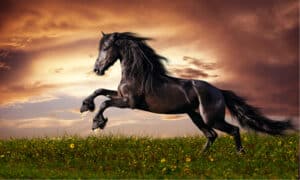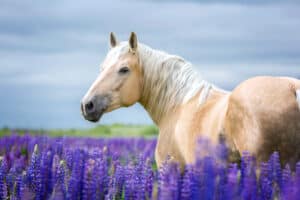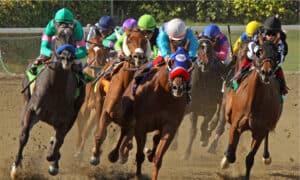You can probably imagine the classic neigh of a horse. But horses emit a range of sounds, some of which sound similar to one another. However, when you learn to distinguish one from the other, you can make sense of what they’re communicating. Discover the sounds horses make and what each means!
11 Sounds Horses Make and What Each Means
1. Whinny
A whinny, also called a neigh, is the most characteristic sound horses make. If you don’t make constant contact with a horse, a whinny or neigh may be the only sound that comes to mind. However, those who work with horses intimately know they make a range of vocalizations, each with their own specific meaning.
Emily Plemons, owner of Crepe Myrtle Acres Horseback Riding, is familiar with horses and can decipher each sound. She works in Angier, NC, and told A-Z-Animals, “The whinny is a soft but high-pitched sound they use as a greeting to other horses. If riding or walking with your horse and they see another horse, usually they put their ears up and forward and whinny with their mouth open so they can basically say, ‘Hey, I’m here,’ to their fellow friends.”
2. Blow
A horse makes a blowing sound when it pushes air quickly out of its nostrils. This is a sound that signals the horse is startled. It has spotted something that signals danger and it’s communicating to its fellow horse friends that there is something afoot. The sound is only about half a second long but it’s able to reach nearly 100 feet all around, alerting any horses in the vicinity that there’s something unknown in the area.
When a horse blows, you can see how its nostrils fully dilate. They keep their mouth closed while they make this sound and often, they blow a few more times after the initial sound. They’re also using their olfactory sense to determine what it is they’ve just uncovered. This blow sound puts all horses in the vicinity on alert instinctively. This happens without a single conscious thought and a horse may react by engaging in either a flight or fight response.
3. Groan
When a horse groans, it’s a very low tone that seems to come deep from within the animal. The length of a groan differs. Sometimes, it’s a short sound that seems kind of shallow. Other times, a horse groans in a more guttural and prolonged way.
Some horses are a lot more expressive than others and may exhibit groaning vocalizations more regularly than horses with other types of personalities. While a groan might just be part of your horse’s natural vocalizations, this sound could also signal that there’s something wrong. Your horse might be experiencing pain or discomfort that may require veterinary care.
4. Grunt
A grunt is similar to a groan in that it’s more of a low, guttural sound but unlike a groan, a grunt typically signals immediate discomfort. Your horse may also be feeling annoyed.
When your horse repeatedly grunts, however, it could be signaling a deeper issue. But you have to consider the circumstances. If your horse is exerting itself, it’s natural for it to grunt. It’s kind of like when you try something particularly strenuous, and you also let out an almost involuntary grunt.
5. Nicker
A nicker is usually an affectionate sound. It’s a lot gentler than some of the other sounds horses make and when they make this sound, they keep their mouth closed. If you own a horse, you’ve probably heard your horse nicker as you approach it. It’s excited to see you and is greeting you with a kind expression. This sound is also accompanied by forward ears and a sustained gaze.
Nickers also happen when you’re about to feed your horse some food. However, a horse may also nicker if it is feeling threatened. The difference between the two nickers is when your horse is feeling threatened, its ears start flicking back and forth and you can see the tension build up in its body.
6. Snort
A snort is very similar to a blow in that it either signals that your horse is excited or surprised by something. They blow out air through their nostrils and you can typically make out the reason why they are responding this way.
Maybe they’ve spotted a friend out in the pasture or they’re just excited to get out and gallop. While this is a normal sound that horses make, it is important to take note when a snort is accompanied by other visual cues. For example, if your horse raises its head or its tail, it may be getting ready to move abruptly.
7. Scream
A scream is a sound you won’t often hear from your horse. Usually, horses only emit this sound when they are engaged in a physical altercation with another horse. Horses fight when in herds to establish dominance.
Eventually, one horse submits to the other and things settle down again. This happens out in the wild but if you have horses and they start to make screaming sounds, you may need to separate them to prevent things from escalating.
8. Squeal
A squeal is a high-pitched sound that your horse makes for several reasons. This may be an initial test when meeting a new horse to determine if they’re going to play nice.
However, a squeal may also occur if your horse is startled by a sudden sharp pain — like when another horse kicks or bites it. When a mare isn’t interested in a stallion, she may also squeal as a way to communicate that it’s not happening. She may follow up the squeal with a quick kick to drive the point home!
9. Roar
If a horse is roaring, it could signal that it’s scared or angry. Something about what’s happening has made your horse feel unsettled so it emits this sort of throaty sound that is intended to scare off anyone or anything that may be putting it on alert.
There is a condition called laryngeal hemiplegia that sounds kind of like roaring and may also sound like whistling. This happens when your horse is exercising. If this is occurring with your horse, your veterinarian should be able to perform a full evaluation to determine what is causing this abnormal sound.
10. Sigh
Interestingly, horses sigh much like humans do. When a horse sighs, it could be that it is feeling relaxed. It sounds like they take a very long breath and then exhale without concern for the sound they make.
If they’re content, this is a sound you may hear. However, a sigh may also occur when your horse isn’t being stimulated enough. It’s a sound of boredom in horses as much as it is in humans.
11. Snore
When a horse is lying down, it may make a snoring sound. But snoring isn’t reserved for moments when a horse is snoozing. A horse may also make a snoring sound as a warning. It may be feeling anxious and the snoring sound lets you know it’s about to react. Learning how your horse gestures puts you in the optimal position during training, especially when you need to de-escalate.
The photo featured at the top of this post is © Stanislavskyi/Shutterstock.com
Thank you for reading! Have some feedback for us? Contact the AZ Animals editorial team.






